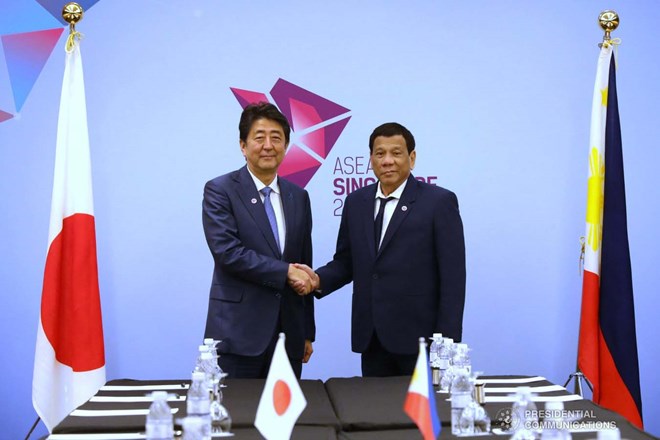Philippines, Japan vow to maintain freedom of navigation in East Sea
Philippine President Rodrigo Duterte and Japanese Prime Minister Shinzo Abe have reaffirmed to maintain freedom of navigation in the East Sea, a vital shipping lane for Southeast Asian nations.
 |
| Philippine President Rodrigo Duterte (R) meets with Japanese Prime Minister Shinzo Abe after the closing of the 33rd ASEAN Summit (Source: mb.com.ph) |
Duterte and Abe had “a productive and fruitful” bilateral meeting on November 15 right after the closing of the 33rd ASEAN Summit in Singapore.
“Both leaders also discussed issues pertaining to the disputed East Sea, during which President Duterte stressed the Philippines’ commitment to uphold the principles of freedom of navigation and overflight, freedom of commerce and other lawful activities, exercise of self-restraint, and the peaceful resolution of disputes,” Philippine Presidential Spokesperson Salvador Panelo said in a statement.
Though Japan is not a claimant in the East Sea, the country considers the waterway as a vital sea lane for trade in the region.
Also regarding the East Sea, US Vice President Mike Pence on November 16 called on the Association of Southeast Asian Nations (ASEAN) to soon finalise an effective and binding Code of Conduct (COC) in the waters.
Most of ASEAN partners have pledged to join hands in creating a favourable environment for dialogue, cooperation and trust building in a bid to turn the East Sea into a sea of peace, cooperation and development through the effective and practical negotiations on the COC based on international law, including the 1982 United Nations Convention on the Law of the Sea (UNCLOS).
At the 33rd ASEAN Summit, Chinese Premier Li Keqiang also affirmed that China will continue working with ASEAN in completing the COC within the next three years and in fully implementing the Declaration on the Conduct (DOC) of Parties in the East Sea, thus contributing to peace, stability, safety and freedom of navigation and aviation, and free trade in the East Sea.
(Source: VNA)